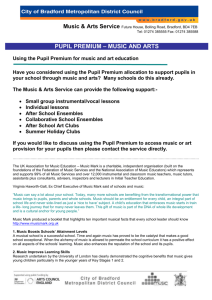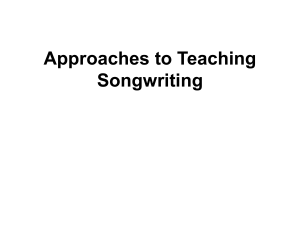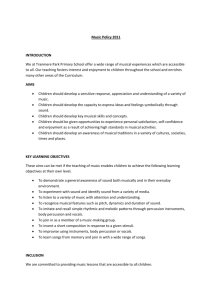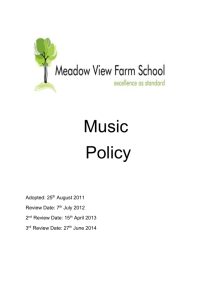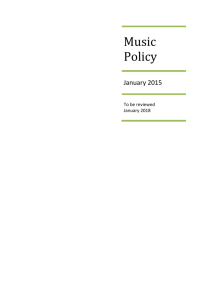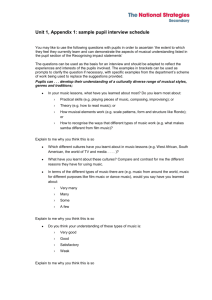Music Policy - Ravenshead C of E Primary School
advertisement
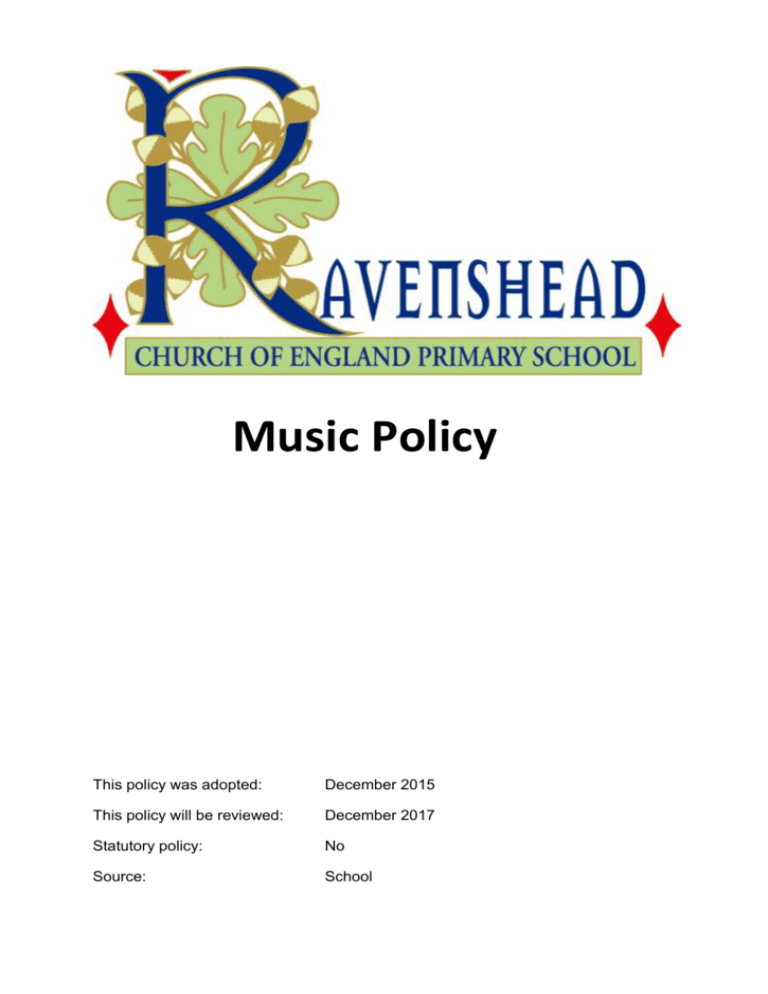
Music Policy This policy was adopted: December 2015 This policy will be reviewed: December 2017 Statutory policy: No Source: School Our School Vision Together, the best that we can be. Our School Mission Reflecting Christian Values expressed in all aspects of the school’s life displaying acceptance and mutual respect. Caring and Nurturing with children and adults having high expectations, celebrating success and making their contribution to a safe, fun, positive and stimulating environment. Exceptional Children who are encouraged to make exceptional progress in academic, creative, moral, social and spiritual development and to become lifelong learners. Partnerships with strong relationships between children, families, staff, governors, the church and the community as a whole. Philosophy Music is a powerful, unique form of communication that can change the way pupils feel, think and act. It brings together intellect and feeling and enables personal expression, reflection and emotional development. As an integral part of culture, past and present, it helps people understand themselves and relate to others, forging important links between the home, school and the wider world. The teaching of music develops pupils’ ability to listen and appreciate a wide variety of music and make judgements about musical quality. It encourages active involvement in different forms of amateur music making, both individual and communal, developing a sense of group identity and togetherness. It also increases self-discipline and creativity, aesthetic sensitivity and fulfilment Aims At Ravenshead C of E Primary we aim to develop an understanding of Musical Concepts and to develop practical skills, enabling children to respond and communicate musical ideas, thoughts and feelings. Opportunity is also given to develop an awareness of musical traditions, styles and cultures. Music in our school allows all children to participate with enjoyment in the activities of: Performing Composing Listening Appraising Through these activities children will develop an understanding of the following musical concepts: Pitch Duration Dynamics Tempo Timbre Texture Teaching and Learning The school uses the Charanga scheme of work to teach music, thus ensuring full coverage of both the Early Learning Goals and the National Curriculum Programme of study. Teachers sometimes supplement their Charanga sessions with ideas and activities from other Music and singing resources the school has, and the Music Coordinator offers support for each Key Stage when necessary. Wherever possible Music is linked to other areas of the curriculum, particularly English and class topics. In KS1 and KS2 music is taught once a week and in the Foundation Stage music forms part of the planned provision for Creative arts. A whole school assembly takes place every week, during which the children learn and practise a wide range of songs. These are often linked with the week’s assembly theme, the current season or time of year where possible. Each KS1 and KS2 class has a daily assembly in addition to the whole school assembly and a song or hymn is sung together. All classes often take part in informal singing sessions using the class teachers’ experience, ideas and activities and the Charanga scheme. We aim to encourage a wide range of teaching styles, including whole-class instruction, individual development and group work. Tasks are differentiated both by outcome and design, and group structures may be of ability, mixed abilities, age or friendship. Planning is based on the Charanga schemes of work which have been fully and effectively integrated into our school topic cycle, in order to ensure balance and progression and to allow cross-Curricular topic links where possible. Planning Planning is at three levels: Whole school – Long term Year group and /or key stage – Medium term Individual teacher – Short term Monitoring and Evaluation This is carried out by the Music Co-ordinator, across all Key Stages and includes: Reviews of teacher’s planning to assess curriculum coverage, progression, appropriate adaptations, annotations and informal assessments. Monitoring of pupil work and performance by talking to children about their learning. Observation of teaching and learning during music lessons. Moderation of any written, pictorial or recorded work. Staff meetings and INSET to discuss consistency across the school, standards and expectations and where appropriate to update/maintain staff knowledge. Involvement of link governors in development of the subject. Evaluation of extra-curricular activities, e.g. choir, music festivals, musical events in the wider community Pupil Assessment Assessment of pupil work and progress is ongoing by the class teacher and includes observation of pupils working, appropriate questioning and evaluation of any recorded work produced. This not only informs future planning but provides information for a pupil’s records, parent discussions and annual reports. Pupils’ achievements are recorded, if appropriate, and ae kept in class files. Equal Opportunities All pupils regardless of age, gender, ability or cultural background have equal access to the Music Curriculum. The needs of the musically gifted and the less able are recognised and met through: Differentiated questioning Differentiated tasks set Appropriate grouping during the delivery of music lessons. This applies particularly to Composing tasks and Performances. Teachers are advised to inform parents if children show particular talents in Music e.g. recommending peripatetic lessons or attendance to choir. Additional Opportunities Peripatetic staff teach lessons weekly to children who request them. Currently children are learning to play guitar and violin. Visiting groups are encouraged The Music Co-ordinator runs a choir throughout the year. The choir take part in a number of choral events throughout the year and entertain in the local community. The children that learn an instrument in and out of school and those in the choir are encouraged to share their learning by performing in assemblies and sometimes producing a special assembly for the rest of the school and in some cases parents attend The music played as the children enter and leave assembly is chosen by the Music Coordinator but can also be chosen by teachers and/or children. This ensures that children are exposed to a wide variety of music and develops their listening skills and music related knowledge. Resources Some resources are stored centrally but each class has their own set of percussion instruments for use during whole class or group music sessions. The music Co-ordinator is responsible for the acquisition, allocation and maintenance of resources but all staff are encouraged to care for them. An audit of resources is carried out annually to identify any gaps but staff can request resources at any time.

